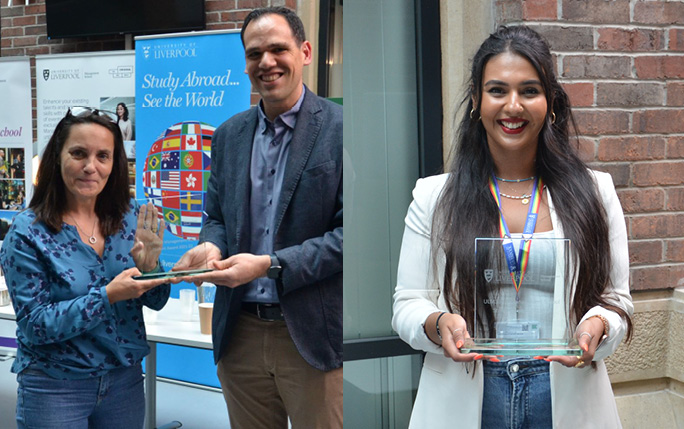2022 Postgraduate Research end of year celebration

The University of Liverpool Management School hosted the annual ‘PGR End of Year Celebration’ ceremony to celebrate its outstanding postgraduate researchers on Wednesday 20 July 2022.
Each year the Management School gives the Andrew Douglas Award to outstanding PhD students. The awards are supported by Dr Andrew Douglas, Managing Director of Fenwall Investments, a graduate of the University of Liverpool (BA Hons Economic History 1982, PhD 1993, MPhil 2000) and a long-standing friend of the University.
The two awards of £500 each were given to Clare Westcott and Ebru Calin, who were nominated for the award by a panel of academics, at a ceremony hosted by Prof Nick Papageorgiadis.
Dr Douglas commented “As an alumnus, I am very proud of my long and continuing association with the University. I am keen to support the School’s development and its emergence as a world class institution.”
In addition to the Andrew Douglas award, eight other PhD students were presented with awards for their achievements this academic year. Each student was presented with a glass plaque and a Waterstones voucher as a token of appreciation for their success. These students were nominated by their fellow PhD students and supervisors for these awards. Nominations were based on areas such as conference presentations, peer support, publications and more.
Congratulations to the following students: Chris Woods, Jack Davis, Yuanjun Feng, Yawen Zheng, Yigit Oezcelik, Julia Marcet Alonso, Jessica Weaver and Yevhenii Skok.
Talking about receiving the Andrew Douglas Awards Clare Westcott, one of the award winners, said: “I was delighted, and surprised, to receive the Andrew Douglas Award. I have returned to study later in life, completing my MBA at The University of Liverpool Management School in 2021. Prior to this I undertook management roles across finance and HR within global pharmaceutical corporations and served as a non-executive director for a multi-site NHS District General Hospital Trust.
“My PhD journey started during the MBA where I realised that business and government needs a paradigm shift to truly deliver value in all its facets – Environmental, Social and Economic. My PhD research focuses on the public procurement processes required to maximise social value delivery. Public procurement is in the unique position to significantly influence social value delivery through its direct actions and via commercial agreements with external providers. My research seeks to understand the operational barriers that could prevent public organisations achieving meaningful social outcomes within the communities in which they operate.
“I have been privileged this year to learn from and work with some fantastic organisations and people, both within the University and the Liverpool region. Receiving this award is not only humbling but also validates the importance of my research. Thank you.”
Talking about her journey at the Management School and her award, Ebru Calin said: “At the PGR End of Year Celebration at the Management School of the University of Liverpool, I was awarded with the Andrew Douglas Award. I feel incredibly grateful and blessed for my first-year achievements to be acknowledged, respected, and seen.
“I would like to thank Andrew Douglas for the generous £500 award. Awarding early career doctoral researchers like me with such award goes beyond lightening financial burdens, it allows me to focus on the most important aspect of my PhD journey: Amplifying marginalised voices.
“For me, this award is a manifestation of feeling hope, of giving hope to others - to all those brilliant human beings out there, that might not feel represented because they have so rarely had the privilege of seeing and speaking to individuals who succeed in academia that may look like them, think like them, feel like them.
“As the child of middle eastern German guest workers, a first-generation graduate, a woman, an academic, an aspiring researcher, and a Queer Muslim - growing up - I knew I had access to many spaces, and yet at the same time, I felt excluded from each one. What I could not name back then became known to me as the "in-between" —a third space, as Homi Bhabha (2004) calls it, a space marked by the intersectional layers of my identity.
“The Donor’s generosity and the unconditional support of my supervisors, family and dear friends allow me to give back to the community by researching this third space, particularly the lived experiences of non-heteronormative and non-white religious women professionals and thus, amplifying the voices of those experiencing overlapping forms of oppression in order to understand the depths of the inequalities and the relationships among them in organizational contexts.
"I hope one day I will be able to help students achieve their goals and give the same hope just as was given to me.”